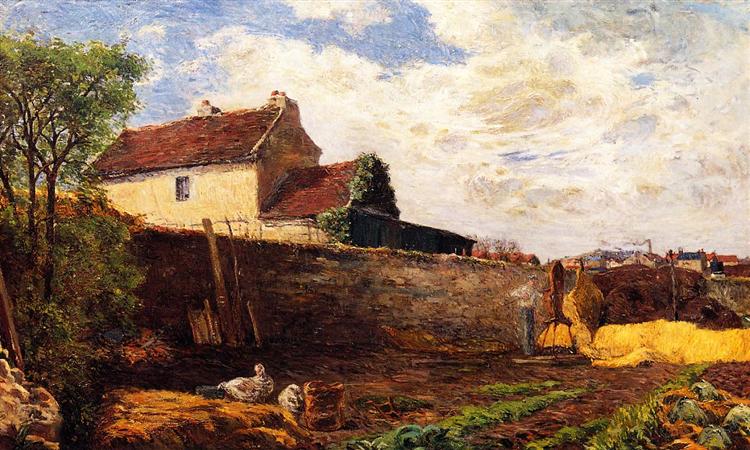Description
Paul Gauguin's 1879 work Geese on the Farm offers us a window into a transitional moment in the artist's career. Although still under the influence of Realism and Impressionism, he was beginning to experiment with a style that would later define his work. In this painting, the viewer is taken to a rural space, where the geese, the main subjects of the composition, are displayed in a scene that evokes both the tranquility of the countryside and the vitality of the natural environment.
The composition of the painting is notable for its simplicity, but also for its balance. The geese occupy the middle and foreground of the work, while the background is made up of a landscape that, although diffuse, suggests a barn and some trees, typical of a farm. The arrangement of these elements on the canvas generates a structure that draws the eye to the geese, whose bright white contrasts with the darker tones of the background. This choice of composition aligns with the characteristics of Impressionism, where the use of light and colour plays a fundamental role in defining the atmosphere of the scene.
In terms of colour, Gauguin deploys a relatively limited, but effective palette. The geese, depicted in light tones and subtle shadows, seem to come alive in the surrounding space. The greener and browner colours of the environment, which dominate the background, further highlight the luminosity of the birds. The interplay between the different colours not only adds depth to the work, but also creates a sense of harmony in the depiction of nature.
Gauguin, known for his ability to capture the essence of his subjects, has chosen to show the geese in an everyday moment that could easily go unnoticed. By focusing on this domestic scene, the artist invites the viewer to reflect on rural life and its simplicity, contrasting it with the tensions of urban life that were beginning to emerge in the late 19th century. This theme of rural life is also seen in other contemporary works by Gauguin, where he explores the natural world and the simplest elements of existence.
Although Geese on the Farm is not as well known as some of his later works, such as The Starry Night or The Spirit of Death, it is essential to understanding Gauguin's evolution and the evolution of art in this period. The work marks a bridge between his technical training as a painter and his later exploration of more symbolic and colorful forms that would characterize him later on. It also reflects the artist's interest in agrarian life and the spiritual connection that can be found in nature.
In conclusion, Geese on the Farm is a work that, despite its apparent simplicity, exudes an emotional and visual richness that transcends its subject matter. Through composition, color, and the representation of the everyday, Gauguin manages to create an atmosphere that resonates with the viewer, inviting them to experience the peace and beauty found in the humblest moments of life. Thus, this work stands not only as a testament to Gauguin's talent, but also as a key piece in the artistic history of the late 19th century.
KUADROS ©, a famous painting on your wall.
Hand-made oil painting reproductions, with the quality of professional artists and the distinctive seal of KUADROS ©.
Painting reproduction service with satisfaction guarantee. If you are not completely satisfied with the replica of your painting, we will refund 100% of your money.

